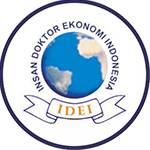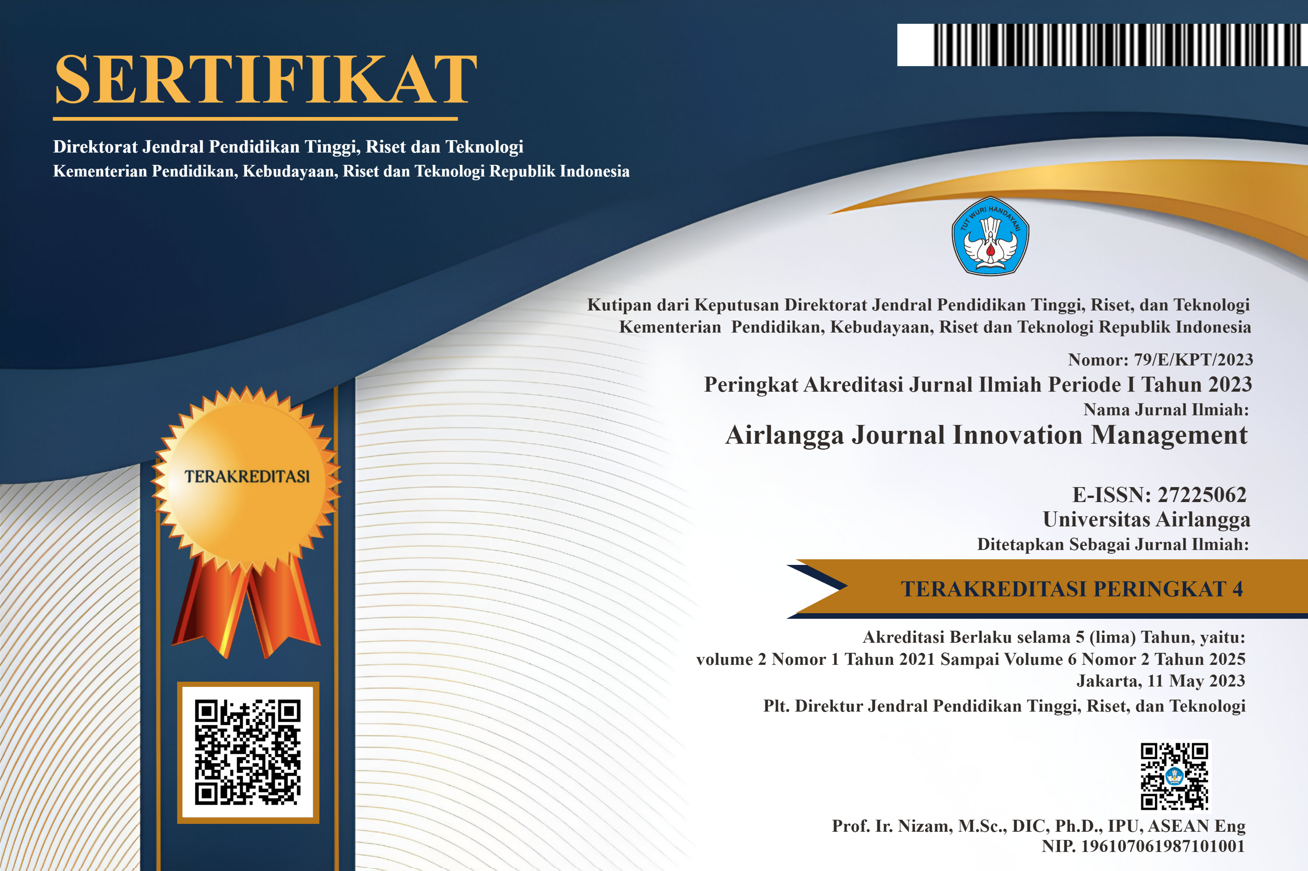Gen Z and Halal Local Cosmetics
Downloads
This research aims to determine the influence of the halal label, knowledge and religiosity on local cosmetics labeled halal. Looking at the surrounding environment, many generation Z people still don't care about choosing local cosmetics that are labeled halal. Apart from that, this research advises consumers or cosmetic users to be careful in choosing the cosmetic brands they use, especially local cosmetics. Therefore, the author decided to conduct research on generation Z, both men and women who live in Jabodetabek. Around 112 respondents completed the survey, and data collection was done using questionnaire. The data were analyzed using software SmartPLS 3.0 with analysis method structural equation modeling (SEM). Result showed that consumers' decisions to buy are significantly and favourably influenced by the halal label. This shows that consumers are increasingly aware of the importance of choosing locally produced cosmetics that are halal certified. Further evidence of a noteworthy degree of awareness of the significance of selecting halal-labelled products comes from the significant link that exists between customers' knowledge of local cosmetics and their shopping decisions. This study suggests further exploration of the specific factors that drive the positive influence of the halal label and emphasizes the need for a deeper understanding of the complex dynamics between religiosity and purchasing decisions, thereby contributing valuable insights for industry stakeholders.
Akmad Salindal, N., Ismail Ahmad, M., Abdullah, K., & Paguimanan Ahmad, B. (2018). A Structural Equation Model of The Halal Certification and Its Business Performance Impact on Food Companies. International Journal of Economics, 26(1), 185–206.
Apriandi, D. W., Agustin, N., & Sugandi, A. (2021). The Effect of Halal Certification and Price Perception on Purcashing Decision (Survey of Ms Glow Skincare Consumers in Subang Regency). Islamic Economic, Accounting and Management Journal, 3(1), 1–29.
Aprilia, S., & Priantina, A. (2022). Analisa Strategi Peningkatan Sertifikasi Halal Sektor Kuliner Di Bangka Selatan. International Journal Mathla'ul Anwar of Halal Issues, 2(1), 50–71. https://doi.org/10.30653/ijma.202221.46
Ardi, N., & Isnayanti. (2020). Structural Equation Modelling-Partial Least Square to Determine the Correlation of Factors Affecting Poverty in Indonesian Provinces. IOP Conference Series: Materials Science and Engineering, 846(1). https://doi.org/10.1088/1757-899X/846/1/012054
Briliana, V., & Noviana, R. (2016). The antecedents and outcome of halal cosmetic products: a case study in jakarta indonesia. International Journal of Business, Economics and Law, 11(2), 1–9.
Chusna, A. F. F., & Mustofa, R. H. (2024). Pengaruh Religiusitas, Norma Subjektif, dan Harga Produk terhadap Keputusan Pembelian Kosmetik Halal ditinjau dari Purchase Intention. Ekonomis: Journal of Economics and Business, 8(1), 551. https://doi.org/10.33087/ekonomis.v8i1.1569
Ekonomi, J., Teori, S., & Izza, N. N. (2023). Uncovering Halal Label Food Purchase Intention Behavior in Indonesia : A Twitter Analytics and SEM-Based Investigation Mengungkap Perilaku Niat Pembelian Makanan Label Halal di Indonesia : Investigasi Berbasis Analisis Twitter dan SEM Izza & Akbar / Jurna. 10(6), 551–570. https://doi.org/10.20473/vol10iss20236pp551-570
Ernawati, S., & Koerniawan, I. (2023). Pengaruh Label Halal Dan Kesadaran Halal Terhadap Minat Pembelian konsumen pada produk UMKM di kota bima. Jurnal Ilmiah Ekonomi Dan Bisnis, 16(1), 207–215.
Fauziana, H., Wardhana, A. K., & Rusgianto, S. (2022). The Effect of Education, Income, Unemployment, and Poverty toward the Gini Ratio in Member of OIC Countries. Daengku: Journal of Humanities and Social Sciences Innovation, 2(2), 181–191.
Ghifara, A. S., Iman, A. N., Wardhana, A. K., Rusgianto, S., & Ratnasari, R. T. (2022). The Effect of Economic Growth, Government Spending, and Human Development Index toward Inequality of Income Distribution in the Metropolitan Cities in Indonesia. Daengku: Journal of Humanities and Social Sciences Innovation, 2(4), 529–536.
Haryani, P. B. N. &. (2019). No. 46 / Th. XXVI / April 2019 Jurnal Ekonomi Manajemen dan Akuntansi. 46, 82–90.
Ihsana, K., Hakim, R., & Sulistyono, S. W. (2021). International Journal of Islamic Economics Development and Innovation (IJIEDI) Analisis Faktor-Faktor yang Mempengaruhi keputusan Pembelian Produk Makanan Berlabel Halal di Kalangan Masyarakat Kecamatan Syiah Kuala Banda Aceh I N F O A R T I K E L : A R T. International Journal of Islamic Economics Development and Innovation (IJIEDI), 1(1), 20–30.
Izza, N. N., Priantina, A., & Rusydiana, A. S. (2023). Utilizing Twitter Data To Uderstand Global Halal Industry Trends and Developments in the Digital Era. Airlangga International Journal of Islamic Economics and Finance, 6(02), 106–129. https://doi.org/10.20473/aijief.v6i02.50700
Juliansyah, A. F., Putri, A. E., Suryadana, M. L., Endyana, C., & Wardhana, A. K. (2021). Global Muslim Response to Bandung Halal Tourism Branding. International Journal of Applied Sciences in Tourism and Events, 5(2), 197–206. https://doi.org/https://doi.org/https://doi.org/10.31940/ijaste.v5i2.197-206
Khan, N., Sarwar, A., & Tan, B. C. (2020). Determinants of purchase intention of halal cosmetic products among Generation Y consumers. Journal of Islamic Marketing. https://doi.org/10.1108/JIMA-11-2019-0248
Khumaeroh, F. A., Yanusa, N., Yulianto, A., Riono, S. B., Manajemen, P. S., Ekonomi, F., & Bisnis, D. (2023). Analisis Pengaruh Kualitas Produk, Harga dan Promosi terhadap Keputusan Pembelian Kosmetik Wardah (Studi Kasus di Toko Kosmetik Levina Beauty Brebes). JECMER: Journal of Economic, Management and Entrepreneurship Research, 1(4), 1–14.
Label, D. A. N., Terhadap, H., Pembelian, K., Jamu, P., Studi, P., Industri, T., Pertanian, F., Madura, T., Raya, J., & Po, T. (2019). The Effect Of Halal Knowledge , Halal Awareness And Halal Labels On The Purchase Decision Of Abstrak PENDAHULUAN Produk bersertifikasi halal saat ini menjadi tren konsumen Muslim global . Menurut Syamsudin ( 2014 ), sertifikasi halal memiliki tujuan menin. 03(02), 95–109.
Latte, J., INOVATIF, N. N.-, & 2020, undefined. (2020). PENGARUH LABEL HALAL TERHADAP KEPUTUSAN PEMBELIAN PRODUK KOSMETIK WARDAH DI KALIMANTAN Jumai Latte Nina Narisda Muslimah Sekolah Tinggi Ilmu Administrasi (STIA) Amuntai. Ojs-Inovatif.Web.Id, 2(1), 58–70.
Lesnida. (2021). Penggunaan Komestik Berbahaya dalam Presfektif Hukum Islam. Al-Fikru: Jurnal Ilmiah, 15(1), 53–64.
Lestari, T. D., & Daswan, L. (2023). Pengaruh Religiusitas dan Label Halal terhadap Keputusan Pembelian Kosmetik. Management and Accounting Research Statistics, 3(1), 135–146. https://doi.org/10.59583/mars.v3i1.32
M.S. Al Farisi. (2020). Preferensi Masyarakat Terhadap Pembelian Produk. Jmbk, 1(02), 60–75.
Matondang, Z., Fadlilah Nasution, H., & Saefullah, A. (2019). Pengaruh Pengetahuan Produk, Label Halal, Dan Harga Produk Terhadap Keputusan Pembelian Kosmetik Dengan Religiusitas Sebagai Variabel Moderating. Jurnal Ilmu Ekonomi Dan Bisnis Islam, 4(1), 1–10.
Mohd Suki, N., & Mohd Suki, N. (2018). Halal Cosmetic Products: Do Knowledge and Religiosity Affect Consumers' Attitude and Intention to Use? International Journal of Engineering & Technology, 7(4.38), 764. https://doi.org/10.14419/ijet.v7i4.38.27540
Mutiara, I., & Syahputra. (2018). Pengaruh Pengetahuan Produk dan Produk Halal Terhadap Keputusan Kembelian pada Produk Kecantikan Korea. Jurnal Indonesia Membangun, 17(2), 148–160.
Mutmainah, & Romadhon, M. R. (2023). Influence of Halal Lifestyle, Islamic Branding, and Social Media Marketing on Muslim Fashion Purchasing Decisions. Airlangga Journal of Innovation Management, 4(2), 158–171. https://doi.org/10.20473/ajim.v4i2.49714
Niswah, F. M. (2018). Hubungan Persepsi dan Religiusitas terhadap Keputusan Pembelian Kosmetik Tanpa Label Halal. Jurnal Middle East and Islamic Studies, 5(1), 47–66.
Nurdin, Sahidillah & Setiani, P. N. C. (2021). Penggunaan Label Halal dan Harga dalam Meningkatkan Keputusan Pembelian Produk Kosmetik. Sain Manajemen, 3(2), 111–122.
Nurhayati, T., & Hendar, H. (2020). Personal intrinsic religiosity and product knowledge on halal product purchase intention: Role of halal product awareness. Journal of Islamic Marketing, 11(3), 603–620. https://doi.org/10.1108/JIMA-11-2018-0220
Nurmaya Adianti, S., & Ayuningrum, F. (2023). Pengaruh Label Halal Terhadap Keputusan Pembelian Produk Kosmetik Wardah. Jurnal Al-Fatih Global Mulia, 5(1), 45–56. https://doi.org/10.59729/alfatih.v5i1.60
Pahutar, I., Pristiyono, P., & Simanjuntak, D. (2023). Analisis Tingkat Pengetahuan Konsumen dan Label Halal terhadap Kepuasan Konsumen melalui Keputusan Pembelian. Remik, 7(2), 1108–1118. https://doi.org/10.33395/remik.v7i2.12285
Pratiwi, A. C., Wardhana, A. K., & Rusgianto, S. (2022). Application of Vector Error Correction Model on Macroeconomic Variables toward Changes in the Composite Stock Price Index. Daengku: Journal of Humanities and Social Sciences Innovation, 2(2), 219–229.
Putra, G., Arifin, Z., & Sunarti, S. (2017). Pengaruh Kualitas Produk Terhadap Keputusan Pembelian Dan Dampaknya Terhadap Kepuasan Konsumen (Survei Pada Mahasiswa Administrasi Bisnis Fakultas Ilmu Administrasi Angkatan 2013 Dan 2014 Universitas Brawijaya Yang Melakukan Pembelian Paket Data Kampus). Jurnal Administrasi Bisnis S1 Universitas Brawijaya, 48(1), 124–131.
Rahman, A. A., Hashim, N. H., & Mustafa, H. (2015). Muslims in cyberspace: exploring factors influencing online religious engagements in Malaysia. Media Asia, 42(1–2), 61–73. https://doi.org/10.1080/01296612.2015.1072343
Rahman, M. S., Hossain, M. A., Hoque, M. T., Rushan, M. R. I., & Rahman, M. I. (2021). Millennials' purchasing behavior toward fashion clothing brands: influence of brand awareness and brand schematicity. Journal of Fashion Marketing and Management: An International Journal, 25(1), 153–183.
Rizal, T. P. L. B. & M. (2016). Pengaruh Labelisasi Halal terhadap Keputusan Pembelian Sosis di Kuala Simpang Kabupaten Aceh Tamiang. Jurnal Manajemen Dan Keuangan Unsam, 5(1), 431–439.
Ryandono, M. N. H., Mawardi, I., Rani, L. N., Widiastuti, T., Ratnasari, R. T., & Wardhana, A. K. (2022). Trends of research topics related to Halal meat as a commodity between Scopus and Web of Science: A systematic review. F1000Research, 11(1562), 1562.
Ryandono, M. N. H., Permatasari, S. A., & Wijayanti, I. (2019). Business behavior in an islamic perspective: Case study of muslim woman entrepreneurs in Ikatan Wanita Pengusaha Indonesia (IWAPI). 12th International Conference on Business and Management Research (ICBMR 2018), 154–159.
Santoso, T. B., & Kusuma, A. (2023). The Development of the Usage of Blockchain for Waqf and Zakat Globally: A Bibliometric Study. International Journal of Mechanical Computational and Manufacturing Research, 13(3), 83–91.
Saputra, N., & Tresnati, R. (2020). Pengaruh Kesadaran Halal dan Pengetahuan Produk Halal terhadap Keputusan Pembelian pada Wisata Halal di Bali. Prosiding Manajemen, 6(1), 47–49.
Tahliani, H., & Renaldi, R. (2023). Sertifikasi Halal Dan Implikasinya Untuk Meningkatkan Daya Saing Perusahaan. Syar'ie : Jurnal Pemikiran Ekonomi Islam, 6(1), 1–12. https://doi.org/10.51476/syarie.v6i1.444
Wardhana, A. K. (2020). Should be halal? is there any correlation between halal and vaccine? bibliography study in SCOPUS indexed academic paper. Journal of Halal Product and Research (JHPR), 3(2), 80–87. https://doi.org/https://doi.org/10.20473/jhpr.vol.3-issue.2.80-87
Wardhana, A. K. (2021). The Application of Waqf and Endowment Fund Based on the Principles in the Sharia Maqashid Pillar Society. Prosperity: Journal of Society and Empowerment, 1(2), 107–119. https://doi.org/10.21580/prosperity.2021.1.2.8829
Wardhana, A. K. (2022). JANJI (WA'AD) SEBAGAI JARING PENGAMAN PADA TRANSAKSI KEUANGAN DAN BISNIS SYARIAH. Jurnal Keislaman, 5(1), 124–132. https://doi.org/https://doi.org/10.54298/jk.v5i1.3412
Zakik, Z., Kamil, A., Prasetyo, A. S., Ryandono, M. N. H., & Wijayanti, I. (2022). Economic development on Madura Island through halal tourism: A business feasibility study. Al-Uqud: Journal of Islamic Economics, 6(2), 289–303.
Copyright (c) 2024 Airlangga Journal of Innovation Management

This work is licensed under a Creative Commons Attribution-NonCommercial-ShareAlike 4.0 International License.
- The journal allows authors to hold copyright without restrictions and retain publication rights without restrictions. The author retains the copyright and grants the first publication rights to the journal, with his work simultaneously licensed under the Creative Commons Attribution-NonCommercial-ShareAlike 4.0 International License (CC BY-NC-SA). This license allows others to share the work with acknowledgment of authorship and initial publication in this journal, provided that the work is not used for commercial purposes and that any derivative works must use the same license.
- Authors may enter into additional contractual agreements for non-exclusive distribution of the journal publication version (e.g., uploading it to an institutional repository or publishing it in book form), while still including acknowledgment of the initial publication in this journal.
- Authors are allowed and encouraged to upload their work online (e.g., in an institutional repository or personal website) before and during the submission process. This can support productive scientific exchanges as well as increase citations to published works.

AJIM by UNAIR is licensed under a Creative Commons Attribution-NonCommercial-ShareAlike 4.0 International License.





















